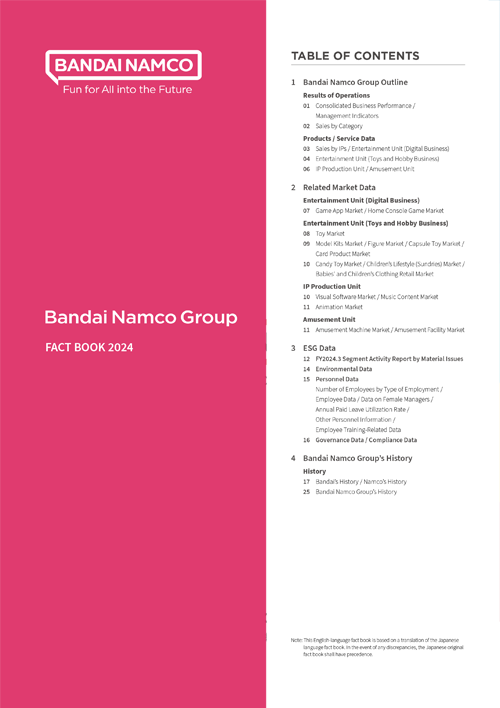

 The TEKKEN series of 3D fighting videogames
The TEKKEN series of 3D fighting videogames
 Starting in December 1994 as an arcade game, TEKKEN is a 3D fighting game series that is now developed primarily for home console games. In 2017, the Guinness World Records identified the TEKKEN series as being the “Longest-running 3D fighting videogame franchise” and having the “Longest-running videogame storyline.” In 2024, the series celebrated its 30th anniversary.
Starting in December 1994 as an arcade game, TEKKEN is a 3D fighting game series that is now developed primarily for home console games. In 2017, the Guinness World Records identified the TEKKEN series as being the “Longest-running 3D fighting videogame franchise” and having the “Longest-running videogame storyline.” In 2024, the series celebrated its 30th anniversary.
TEKKEN™8 & ©Bandai Namco Entertainment Inc.
Originally released for arcades in 1994, the Tekken series celebrated its 30-year anniversary in December 2024. In 2017, the Guinness World Records identified the series as being the “Longest-running 3D fighting videogame franchise” and having the “Longest-running videogame storyline.” As a result of our ongoing efforts to create new releases for the series, TEKKEN has grown to become an iconic title among the many 3D fighting games that have been released over the years. The success of the series is due mainly to its ongoing evolution over its 30-year history, driven by technology, and that it has flexibly adapted to the constantly changing business models in the gaming industry. Additionally, its success can be attributed to its thorough adoption of a fan and community-centric marketing approach. Drawing on the know-how we have continuously accumulated over the years, we have been able to successfully develop TEKKEN into a historically significant Bandai Namco IP that boasts a major presence in the gaming industry.
 Starting in December 1994 as an arcade game, TEKKEN is a 3D fighting game series that is now developed primarily for home console games. In 2017, the Guinness World Records identified the TEKKEN series as being the “Longest-running 3D fighting videogame franchise” and having the “Longest-running videogame storyline.” In 2024, the series celebrated its 30th anniversary.
Starting in December 1994 as an arcade game, TEKKEN is a 3D fighting game series that is now developed primarily for home console games. In 2017, the Guinness World Records identified the TEKKEN series as being the “Longest-running 3D fighting videogame franchise” and having the “Longest-running videogame storyline.” In 2024, the series celebrated its 30th anniversary.TEKKEN™8 & ©Bandai Namco Entertainment Inc.
 Reception of the newly released TEKKEN 8
Reception of the newly released TEKKEN 8
The all-new TEKKEN 8 was released in January 2024, roughly nine years since the previous title TEKKEN 7 was released in arcades, and six-and-a-half years since it was released for home consoles. On the day that it was released, TEKKEN 8 shipped 1 million copies worldwide, and this number exceeded 2 million throughout the ensuing month. This greatly outpaced the number of copies sold and sales revenue of TEKKEN 7 over the same time period at the start. This sales performance reflects how highly customers thought of the product, which was developed by Bandai Namco Studios Inc. In addition, through analysis, we have recognized that the sales of TEKKEN 8 were due to the fact that, for the first time ever with a numbered title in the franchise, we released the game for home consoles simultaneously across the globe without first launching it in arcades. Moving forward, we will continue to roll out a wide range of initiatives aimed at acquiring both new fans and fans who have purchased previous TEKKEN titles, thereby further accelerating the pace of sales. Sales of the previous TEKKEN 7 greatly exceeded our initial forecast at the time the game was released due to various factors. These included the widespread adoption of the games-as-a-service (GaaS) model, whereby free updates and downloadable content are offered on an ongoing basis, as well as the popularization of online game streaming and esports, which has led to increased participation from parties other than players, such as online viewers and spectators. Another factor was the increase in demand for home console games following the spread of COVID-19. Taking into account the factors behind the success of TEKKEN 7, we commenced the product design process for TEKKEN 8 based on the premise of having fans play the game intensely and for long periods of time. We also established a structure emphasizing management from a long-term perspective that extends long past the game’s release. Additionally, we are working to further advance our esports initiatives, which we began in earnest starting from TEKKEN 7, in an effort to retain core fans and acquire new viewers. At the same time, we are stepping up efforts to expand the economic ecosystem of the IP in terms of both online and offline, through developments that go beyond the game business to include other businesses such as music and licensing.
 Establishment of TEKKEN as a captivating and long-lasting IP (turning point for branding and fan marketing)
Establishment of TEKKEN as a captivating and long-lasting IP (turning point for branding and fan marketing)
We have continued to create new releases throughout the 30-year history of the TEKKEN series. What has supported the series over that time is not only the high level of completion for each game but also the original branding and marketing activities we have implemented on a continuous basis. A major turning point in our branding approach came in the 1990s, when the market began to shift from businesses focused on amusement facilities to ones focused on households. At that time in Japan, it was commonplace to make a home console version of a game that was popular in the arcades. The development team of TEKKEN, however, began to observe trends in overseas markets and noticed how, year after year, the culture of going to the arcades was slowly diminishing, primarily in Europe and the Americas, and that business models in those markets were changing as a result. In anticipation of a shift to an era in which TEKKEN would be played not only at amusement facilities but also at home on a repeated basis, we began experimenting with efforts to offer new experiential-based value that could only be realized via a home console game title. The results of this effort have led to the current style of TEKKEN that you see today. For example, we created narratives for each character that appears in the game, allowing fans to enjoy a character for both their gameplay and their story. Also, in addition to the conventional versus mode where players can fight using each character, we added a story mode and minigames. Both of these ideas came to us when we transitioned to home console games and enabled us to further expand our fan base. The nature of gaming has evolved alongside the transformation of business models and platforms and the changing era. Accordingly, we have consistently reviewed TEKKEN’s game design from the perspective of users. Even while doing so, however, the fundamental appeal of TEKKEN of bringing together players and spectators, which has been woven into the game’s DNA, has remained unchanged, and I believe this is why the IP has enjoyed the support of fans for many years. In our marketing activities for the TEKKEN series, we have placed the utmost importance on always listening to the opinions of fans and gathering comprehensive information. We visited regions around the world where TEKKEN is being played to gather raw information on how the game is being enjoyed, the age range of fans, their actual reaction to the game and level of excitement, and changes in their needs. This information was then incorporated into our development and marketing strategies. Furthermore, even before the words “social media” existed, we communicated directly with fans via online message boards, earnestly taking in both praise and criticism. By doing so, we were able to incorporate such feedback into the development process with a strong sense of objective. By honestly pursuing these marketing activities over the course of 30 years, we have fostered a deep connection with our fans that has helped us establish the TEKKEN series as an IP loved and supported by them for many years.
 Reasons for the popularity of TEKKEN—an IP with an overseas sales ratio of over 95%
Reasons for the popularity of TEKKEN—an IP with an overseas sales ratio of over 95%
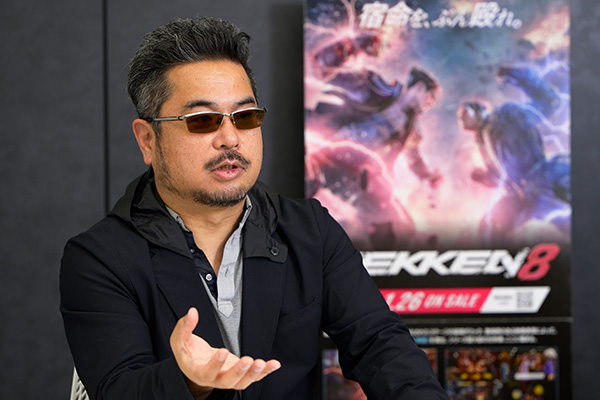
Overseas sales accounted for over 95% of total sales for the previous title TEKKEN 7, and the series itself has been tremendously popular overseas from a very early stage in its history. From as early as around 1995, when TEKKEN and TEKKEN 2 were released, overseas sales had already made up over half of total sales of the home console versions of these titles. For this reason, we made a considerable investment in conducting a marketing survey in each region around the world in order to gain a detailed understanding of local needs and reflect that in our development and branding activities. Also, in anticipation of the change in demand for arcade games, which was mentioned earlier, we promptly secured overseas human resources to move forward with our transition to development focused on home console games, including localization for various countries and regions around the world. The same division was in charge of overseeing both arcade and home console games development, and this made it easier to draw up a consistent strategy for the IP, which in turn contributed to TEKKEN’s growth as a global brand.
Looking ahead, in order to have even more people engage with the TEKKEN series, we must accurately communicate our overall strategy to local staff in each region and establish a system that enables local staff to incorporate that strategy into initiatives catered to regional needs based on their best judgment.
 High affinity between the TEKKEN series and esports
High affinity between the TEKKEN series and esports
The major turning point for the expansion of the TEKKEN series into esports came in 2019. Until then, the competitive scene for the TEKKEN series, including the TEKKEN World Tournament held by Bandai Namco Entertainment, was dominated by skilled players from Japan and South Korea. From 2019, however, skilled players began to enter the scene from not only Europe and the Americas but also countries that had previously been off the radar, such as Pakistan, Peru, and Côte d’Ivoire. The addition of such players led to a genuine and unique worldwide expansion of the TEKKEN series that was unlike that of any other game title. With the outbreak of COVID-19 in the following year, online game streaming quickly became more widespread, and this led to an increase in fans who were TEKKEN spectators. In addition, after long-standing stay-at-home policies were lifted, people began to appreciate the value of offline events even more. As a result, the TEKKEN series has enjoyed an even greater presence in the current global esports market.
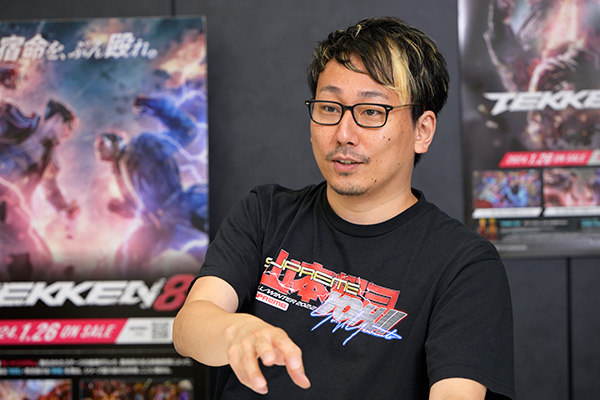
Although “esports” is a term that has been garnering significant attention in recent times, the experience of having players battle against each other, face-to-face, with spectators watching around them is something we have been offering fans for many years through arcade versions of TEKKEN. Furthermore, we developed arcade versions of TEKKEN with a consistent awareness of how we could leave a lasting impact on players who are playing on an arcade machine for the first time. This development approach has helped give TEKKEN a high level of affinity with esports. To date, the value of the TEKKEN series has constantly been enhanced by the intense moments that have occurred in fights between players in real-life settings, and now, these moments happen during esports competitions. No matter where the location, these moments have helped bolster the value of TEKKEN as an IP.
Furthermore, esports has been impacting the economic ecosystem of TEKKEN, which traditionally only involved the two parties of publisher and user. Due to the development of the esports market, a new economic ecosystem is being built that includes third parties who enjoy the series without actually purchasing the game. Such parties comprise not only online viewers and spectators but also event organizers and event and player sponsors. In August 2024, the Esports World Cup was held in Saudi Arabia, with total prize pool of US$1 million, meaning that esports tournaments have reached the point where they are being held on a national scale. Moving forward, we will continue to focus on the expansion of esports as a key piece of infrastructure for the TEKKEN IP as we aim, through esports, to build ecosystems in which the economic growth of TEKKEN ultimately leads to benefits for the fans.
 Enhancement of IP value from real-world and online perspectives
Enhancement of IP value from real-world and online perspectives
We believe that the experiential-based value that fans have consistently expected from the TEKKEN series over its 30-year history lies in the interactions between fans built on a foundation of a competitive culture. For the new title TEKKEN 8, we prepared the TEKKEN Fight Lounge, a massive in-game online metaverse. In the TEKKEN Fight Lounge, players can communicate with each other via customizable avatars, enabling them to enjoy the same kind of community-based culture online as they would in a real-life arcade setting—where players and spectators enjoy the game together. Since COVID-19, there has been greater value found in the experience of people gathering together. In light of this, we believe that creating settings for building communities both online and offline and establishing a structure to manage those communities will help us ensure that fans continue to enjoy the TEKKEN series for many years to come. Without confining ourselves to the framework of video games, we will continue to maximize the value of the TEKKEN IP, including through expansion into business domains other than games.
 KATSUHIRO
KATSUHIROHARADA
 NAOYA
NAOYAYASUDA



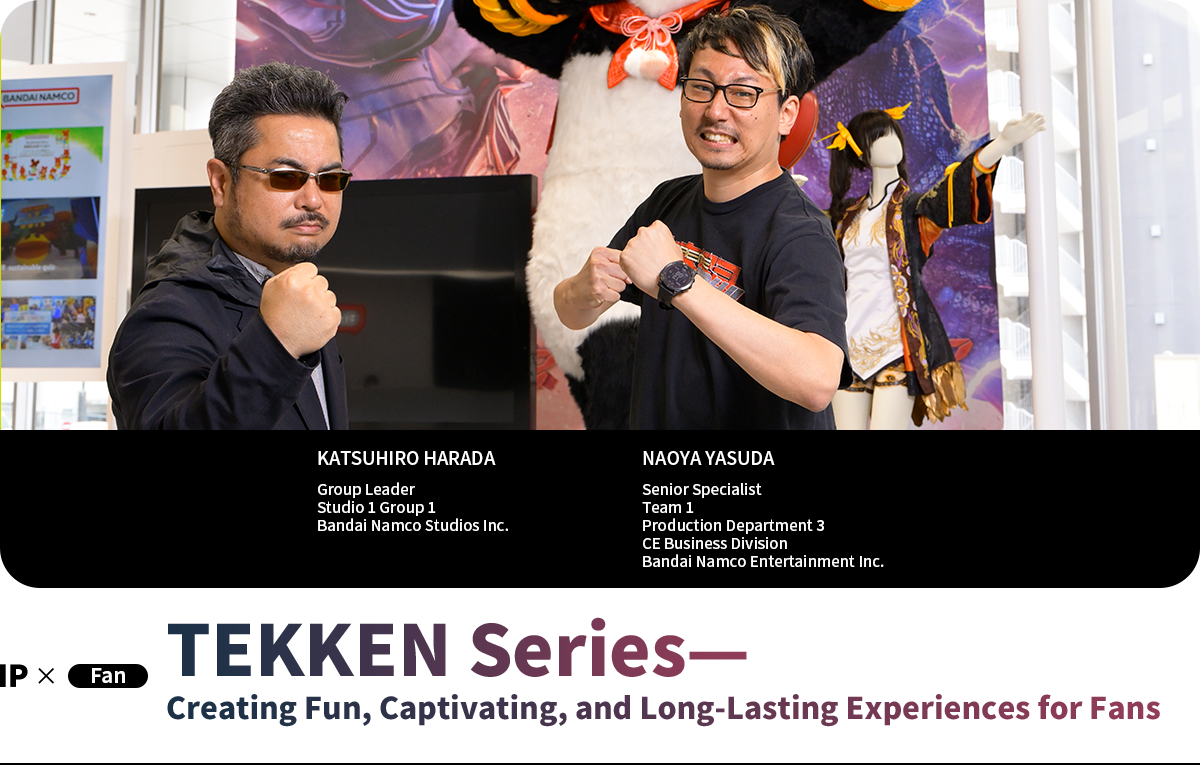
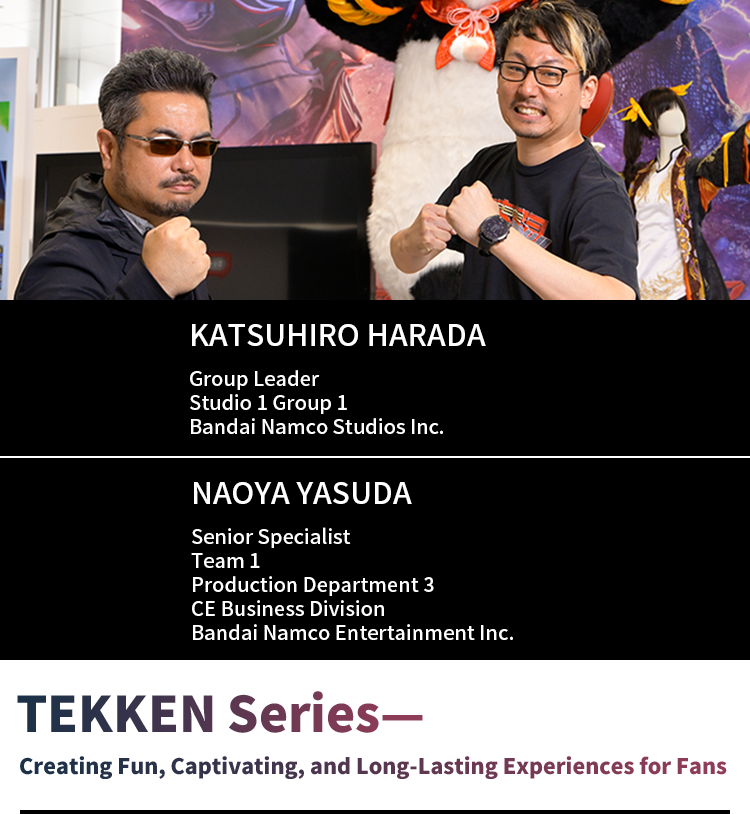

 MESSAGE
MESSAGE Integrated Report 2024
Integrated Report 2024 9.4 MB
9.4 MB DIVERSE RANGE OF BUSINESS AREAS
DIVERSE RANGE OF BUSINESS AREAS